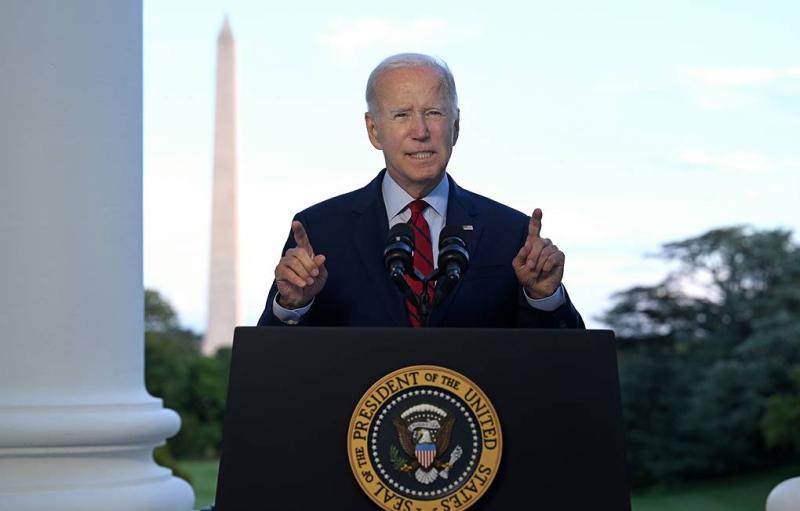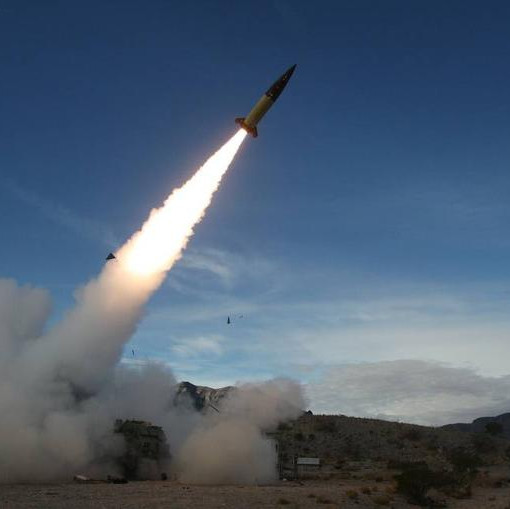
© Jim Watson-Pool/Getty Images/TASS
Top stories from the Russian press on Tuesday, August 2nd, prepared by TASS
Vedomosti: Biden wants to coordinate new START treaty with Moscow
The United States is ready to discuss new measures for strategic arms reduction with Russia if Moscow proves its interest in such negotiations, US President Joe Biden said at the Tenth Review Conference for the Treaty on the Non-Proliferation of Nuclear Weapons in New York.
His speech was supposed to present the US as a "torchbearer of global non-proliferation," Alexander Yermakov, a military expert with the Russian International Affairs Council, asserts. According to him, Biden’s address demonstrated that Washington is preoccupied with self-glorification and so far is not ready for actual steps on ensuring security. According to the expert, the Biden administration does not view Russia as its key rival - the main problem for the US is China with its growing nuclear arsenals. Therefore, Washington wants to freeze Beijing’s strategic armaments before they reach the US level, the expert concluded.
Even in the absence of immediate results, relaunching a dialogue on strategic stability will allow Russia and the US to synchronize watches, share concerns, or, possibly, seek ways to resolve certain differences, according to Dmitry Stefanovich, a research fellow at the International Security Center with the Russian Academy of Sciences’ Institute of World Economy and International Relations. According to him, the package of challenging issues is generally clear. It involves the continued process on strategic offensive arms and an attempt to reach agreements on non-strategic nuclear weapons. The US is more interested in the latter while Russia’s traditional stance is the necessity to withdraw American nuclear gravity bombs from Europe.
Izvestia: Will Serbia and Kosovo reach agreement within month?
In order to resolve the conflict between Serbia and Kosovo, it is essential for the sides to sit down at the negotiating table with the EU’s mediation, a source in the European Commission told Izvestia. It stressed that Belgrade and Pristina should normalize their relations if they want to join the union. Moscow also thinks that those countries that recognized Kosovo and serve as the guarantors of stability in the region should caution their authorities from taking steps that can further escalate tensions. Another deterioration in the Balkans occurred after Pristina demanded that Serbs residing in the north of Kosovo reject documents and license plates they received in Serbia and switch to local documents. The process was supposed to be launched on August 1 yet amid escalation the decision was postponed for one month. Experts polled by Izvestia think that the risk of clashes between the sides still remains.
"[Kosovo] Albanians continue to show to the world, mainly, to Europe and the US, that the issue of granting independence to Kosovo has not been resolved. Serbs need to agree on this. Belgrade is not going for this, and Moscow supports it on this issue," Leading Researcher at the Russian Academy of Sciences' Institute for Slavic Studies Elena Guskova told the newspaper, adding that at the moment Pristina is trying to give as many rights as possible to Albanians as opposed to Serbs. The expert is confident that no military conflict will flare up between the two sides because NATO forces are present in the region while Kosovo practically has its own army already.
"It is possible to hope that during this month Serbia and Kosovo will hold some negotiations. Yet the problem is that Pristina has taken a rather aggressive stance which does not leave room for any talks. It was known in advance that this situation would unfold on August 1 so the conflict itself was predictable. The chances that it would be resolved by September are very slim," the Founder of the Balkanist project, political scientist Oleg Bondarenko said. In his opinion, the EU, as a mediator, does not have enough will and resources to influence Pristina. The implementation of the Brussels Agreement between Serbia and Kosovo is a good example - while Belgrade has almost fully implemented it, Pristina refuses to do so, the expert concluded.
Nezavisimaya Gazeta: Pelosi’s potential Taiwan visit pushes US, China to the brink of armed conflict
The third highest-ranking US politician, Speaker of the US House of Representatives Nancy Pelosi, kicked off her Asia-Pacific tour. On Monday, she visited Singapore and it is announced that she plans to travel to Malaysia, South Korea and Japan. However, the main intrigue of her journey is that Pelosi might pay a visit to Taiwan and this is becoming all the more probable. Pelosi’s official visit can seriously complicate US-China relations. Beijing does not even rule out the use of force in order to prevent this visit of such a high-ranking US official.
"[In 1997, when then Speaker Newt Gingrich visited Taiwan], the Chinese launched missiles in the direction of Taiwan, however, the Americans immediately brought in aircraft carriers and Beijing admitted that it was not capable of competing with this might. Yet times have changed. Nowadays China has bolstered both its economic and military spheres. In fact, back then, for a relatively weak China it was more important to use the benefits of globalization rather than resolve a territorial issue," Deputy Director of the Russian Academy of Sciences’ Institute of World Economy and International Relations Alexander Lomanov said.
The expert told the newspaper that in case of Pelosi’s Taiwan visit, Beijing is ready to respond in such a way that the US would regret its actions. For example, Chinese fighter aircraft may appear in the island’s airspace should planes be used to bring in Pelosi.
"China was hoping that it was possible to reach an agreement with the US and retain the status quo. So it was trying to talk some sense into Washington. These attempts continue now. Yet during the Trump administration it became clear that generally there is no sense in persuasions. China became an adversary for the Americans, not a partner. And Biden follows this direction of Trump’s policy," the expert concluded.
Izvestia: Russia does not view US proposal on prisoner swap as equitable
Russia does not consider the proposed swap of US citizen Paul Whelan for Russian national Viktor Bout as equitable since Whelan was convicted for espionage and this charge does not involve a swap for a civilian, a high-ranking informed source told Izvestia. He noted that Whelan was "caught red-handed" while Bout "is innocent and was framed by Americans." Earlier, US Secretary of State Antony Blinken mentioned the option of swapping Paul Whelan and basketball player Brittney Griner for Bout. Whelan’s attorney Vladimir Zherebenkov told Izvestia that it does not matter whose crime was more serious since the main goal of the two countries is to get their citizens back. Sources in the State Duma (lower house) and the Federation Council (upper house) also told Izvestia that it is too early to finalize the issue on the exchange yet it should be balanced and reciprocal.
The newspaper’s source, however, could not specify whether it would be possible to exchange Bout for the US basketball player who was convicted for drug smuggling. "So far, nothing is clear with regards to this but authorized agencies both from the Russian and the US side are engaged in discussions on this issue," he noted.
The issue of swaps has always been very subjective so the procedure can follow any pattern, member of the State Duma Committee on International Affairs Maria Butina told Izvestia. "These are always agreements between two countries, there are no clearly prescribed rules. So it is necessary to understand that if we’re talking about a "two for two" exchange, and I think that this is the only possible option, then in addition to Viktor Bout it can also include those Russians who are now in custody in NATO countries, since the US positions itself as a player that rules the bloc," the lawmaker noted.
Kommersant: Central Bank’s measures support ruble’s exchange rate
The exchange rates of the world’s leading currencies moved away from local peaks on the Russian market this week with the dollar rate returning to 60 rubles per dollar and the euro dropping below 62 rubles. Analysts note that sales may have been activated by the extension of the Central Bank’s ban on withdrawing foreign currency from accounts - many did not dare to hold it there until next March. Additionally, the Central Bank’s plans to renew the fiscal rule only in 2023 may have also had an impact.
In the basic scenario, Sovcombank does not rule out that the restrictions on withdrawing foreign currency will be extended in March 2023. "We do not expect that Western sanctions on the supplies of foreign cash to Russia will be relaxed in the coming years. Apart from that, Russia adopted a strategic course towards replacing unfriendly currencies with rubles and the currencies of friendly states," Sovcombank’s chief analyst Mikhail Vasilyev explained.
The Central Bank’s decision on foreign cash does not alter the fundamental picture of the excess offer of foreign currency amid record high prices for raw materials with the direct purchases of foreign currency within the framework of the fiscal rule being the only way to battle it. "The ruble is supported by the still high inflow of foreign currency to Russia’s current account balance. Brent quotes are trading over $100 per barrel while gas spot prices in Europe remain above $2,000 per 1,000 cubic meters," the expert noted. This is why, according to Head of the Analysis Unit at Zenit Bank Vladimir Yevstifeyev, restoring the fiscal rule in a modified way is necessary to put pressure on the ruble. He estimates that if the fiscal rule is launched, by the end of Q3, the dollar rate will return to 65-68 rubles per dollar and to 68-72 rubles per dollar by the end of the year.









